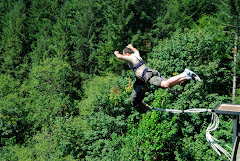Ecology is the study of the natural environment. It goes to reason then that Eco-banking should be banking that takes into consideration the natural environment in how financial services are offered to businesses and individuals who operate within the natural environment.
So how would a bank change the products and services it offers in order to benefit the local ecology? That is a good question. The reason that is a good question is because as bankers we have always looked to improve and increase the ROI / ROE value to our shareholders and our depositors first. By doing this, we preserve the integrity of the bank and provide a safe place to store funds while preserving the financial soundness of the institution. Seems to be the way to do business now and into the future.
Eco-banking asks us to consider additional criteria in our business dealings. How do the services we provide help to preserve and grow the communities in which we are entrusted with our customer's hard earned money? Can we do this any better than we are now? I think we can. Communities are similar to farms. They require fertile soil, attention to the weather, discerning seed activities, and careful nurturing of the resulting growth. Banking services and bankers take on a complimentary role to the farmer - they are the tools in which these activities can be accomplished more efficiently.
There are various methods - each with intrinsic strengths and weaknesses. Some would say that the best banks are those that nurture the mature plantings - they deal with existing businesses and support the continued growth and expansion of those businesses. In my opinion, and ecology oriented bank considers the entire system in its dealings; from start-ups and home-based endeavors to soundly established going concerns.
Each stage in the cycle requires specific care and attention. Attention to soil conditions prompts us to consider public policy and how we might influence our local representatives to take action which promote growth in our communities.
Seed activities involve micro-lending and the growth of the venture capital sector, while also promoting skills development and education of the local single-person service provider to help them avoid common business pitfalls and to accomplish controlled growth and sound fiscal management. As those seedling businesses begin their growth, banks can provide continued education in best business practices, and counsel regarding the broader economy and pending storms and opportunities. Small business lending and treasury services can provide both useful tools and objective oversight of trends and ratios within the growing seedling business. As established businesses expand - providing seed opportunities to the broader Eco-system, while supporting supplier businesses with capital needed to grow as well - Mutuality becomes increasingly important. Finally, at the end of the business life-cycle, an Eco-banker can help with succession planning and help to insure the continuance of the business, thereby promoting the growth of the larger community.
We live in dependent systems and rely on the health and success of the broader business, personal, and natural environments in order to remain resilient and vital. I believe all of us benefit from a vital and growing local and regional economy - no to mention the grander vision of the nation and world. If we can always look outside our small piece of the larger picture, and recognize the numerous ways we can help to create a healthier system, we all benefit from the small efforts of each one of us. Eco-banking, the notion of looking to the greater ecological landscapes around us and endeavoring to promote, sustain and grow that environment, provides a way to accomplish this very noble goal.
WAKE UP !!! Thoughts that help me to live a wakeful life. danweldon@bctonline.com
About Me

- Dan Weldon
- LEED-AP NC v2.2 / MBA - George Fox University / BA - Cal Poly,San Luis Obispo / EERE Finance Program Development / Father to 2 young men of whom I am very proud.
![Reblog this post [with Zemanta]](http://img.zemanta.com/reblog_e.png?x-id=fe332e44-3e4b-4429-9257-586b8eb3cdf5)



